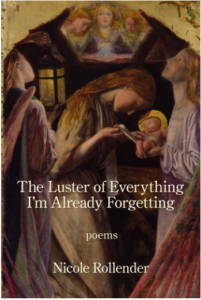 Review by Carole Mertz
Review by Carole Mertz
Rollender Ties Her Faith Concepts to Her Poetic Vision
Nicole Rollender’s emotional and richly endowed poems touch the heart. Very personal, they cover themes of maternal love, dreams and dreaming, religiosity, sobriety, marital fidelity, and angst; and they arrive in mostly weighted tones. The collection’s title alludes to the ephemeral, yet the poet’s pleasantly assonant lines linger, many assembled with vivid imagery. These poems are generally accessible. They present as free verse and some contain ethereal or surrealistic elements. Some remain enigmas, (see “If I Could Have Been Born the Lord’s Dog”). But even in these, adequate use of suggestion and imagery appear. Cover designer Shay Culligan’s choice of an intriguing Arthur Hughes 1858 painting of the nativity, wraps the collection in a warm cover.
Rollender’s eponymous poem renders appealing flavor to her collection’s title. It appears within Part I of her five-part collection. Like “Locution I: We are more wretched than the animals,” it concerns her son and the process of birthing and mothering:
…he wants to sleep standing
like a cow but I beg him to lay down. Cows can only dream
on their veined sides. I think of the mother bear if she isn’t
dead, how was the cub taken unless famine season— but we
have to fight to the death, don’t we. My son asks how he
got out of my body. I tell him he was cut free. & he
says he folded himself like origami before emerging a scorpion
razor-tailing out. (p.24)
The following, excerpted from Locution 1 represents the newborn as a thirsting foal:
…We kept a vigil / his first nights. / No
candlelight. Thirsting foal / who can’t stand / a bird winding
through time. / A boy learns / to hold a gun. / A boy learns
to lay down his life for others. / My son / scattered me
in pieces / glass / parables / aromatic salts / red sky. Two
together / is a miracle.
Here Rollender’s thoughts about the Virgin birth seem inseparably bound to expressions of her own child-birthing. “Listen—” she says, “breaking bread / a shearing / the body of Christ torn asunder / suturing my body…” (p.77)
Some poems hinge suggestions of suicide to their contents, as in “A Body’s a Difficult Thing” and in “Tell Me How You Understand Vanishing Point.” (“The escape / backward homeless plunge / off the balcony / red nightdress floating / this planet a delight / we remember fondly / in the next world.”) (p.55)
The most enjoyable “Notes: Gratitude for Still Being Alive,” (p.59) pulses with death references, murder, the “ghost” of the poet’s grandmother, the apocalypse, and “mazes of poppies [unfurled]inside our brains.” She prays, “O God, who’ll be with us to the end of the age,” offering this as a statement, not a question. The Irish Dymphna, a 7th Century Christian saint, makes an appearance in this poem. Of interest, is the fact that the saint’s name derives from a compound term meaning “poet” and “feminine.” Therefore, Rollender appropriately appeals to this saint when she describes how “A blizzard of voices stir up in my ribs.”
Witness these poem titles—”Lux Aeterna,” “Meditation Excerpt: Mater Dolorosa,” “Meditation Excerpt: Annunciation,” and “Morning Prayer” and you realize how often religious elements enter Rollender’s rich texts and her frequent dream-like poesy. She closes the collection with these lines from her “Litany with Outpouring Light”:
I saw you in my dream, falling beside me into another country—
/
The places we’ve been together, the places with no names—
/
The echo of bee wings everywhere I want to be—
The poem, like several others in The Luster of Everything… registers as a hymn-like paean to the unknowns of motherhood.
The Luster of Everything I’m Already Forgetting by Nicole Rollender
Kelsay Books, 2023
ISBN 9781639803507
Carole Mertz, poet and essayist, has recent reviews with Full Stop, Heavy Feather, Main Street Rag, Mom Egg Review, River Teeth, and Whale Road Review. She served as Poetry Editor for The Ocotillo Review (Issue 8.1) and is Book Review Editor at Dreamers Creative Writing. Carole’s collection Color and Line (Kelsay Books) released in 2021.
